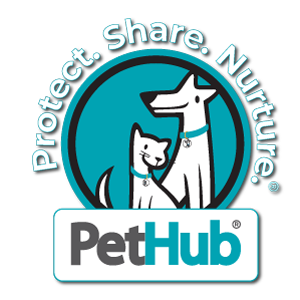The /pets endpoint focuses on the pet profile on PetHub.com. Use this to create a pet profile, retrieve a pet's information, and update its details as documented here.
The main parameter of this endpoint is the pet ID {pid} which is a UUID for a pet.
Digging into /Pets
The /pets endpoint offers the following:
| /pets |
Description |
| / |
POST - creates a new pet profile
|
| /{pid} |
- GET - returns basic profile information such as name, photo, breed, species, age, description, and so on
- PUT - updates a pet's basic profile information
- DELETE - deletes a pet's basic profile and causes all associated data to be deleted as well (e.g. activities, allergies, documents, conditions, foods, medications, etc.)
|
| /{pid}/activities |
- POST - add an activity for a pet
- GET - return list of activities for a specific pet
- DELETE - remove an activity for the pet
|
| /{pid}/allergies |
- POST - add an allergy entry for a pet
- GET - returns a list of allergies associated with a pet
- PUT - updates a pet's existing allergy information
- DELETE - deletes the pet's specified allergy entry
|
| /{pid}/conditions |
- POST - add a condition entry for a pet
- GET - returns a list of conditions for the specified pet
- PUT - updates a pet's existing condition information
- DELETE - deletes the pet's specified condition entry
|
| /{pid}/documents |
- POST - add a file to a pet's profile
- GET - list of documents associated with the pet
- DELETE - remove a document from the website and pet's profile
|
| /{pid}/foods |
- POST - add a food entry for a pet's diet
- GET - retrieve a list of foods on a pet's diet
- PUT - update a pet's food regimen
- DELETE - remove the food entry from the pet's profile
|
| /{pid}/medications |
- POST - Add a medication entry for a pet
- GET - retrieve a list of medications and their details for a pet
- PUT - update a medication entry for a pet
- DELETE - remove a medication from the pet's profile
|
| /{pid}/procedures |
- POST - add a medical procedure entry for a pet
- GET - returns a list of medical procedures associated with this pet
- PUT - update the medical procedure entry
- DELETE - remove a procedure from the pet's profile
|
| /{pid}/tags |
- POST - links a tag to the pet
- GET - returns a list of IDs linked to the pet's profile
- DELETE - unlink the tag from the pet's profile
|
The Swagger 2.0 / OAS YAML rendering is below including the data structures necessary for POST or returned by GET.
